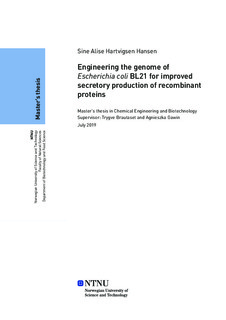| dc.contributor.advisor | Brautaset, Trygve | |
| dc.contributor.advisor | Gawin, Agnieszka | |
| dc.contributor.author | Hansen, Sine Alise Hartvigsen | |
| dc.date.accessioned | 2019-11-06T15:03:40Z | |
| dc.date.available | 2019-11-06T15:03:40Z | |
| dc.date.issued | 2019 | |
| dc.identifier.uri | http://hdl.handle.net/11250/2627023 | |
| dc.description.abstract | Et økt fokus på rekombinante legemidler er sett i den farmasøytiske industrien. De fleste rekombinante legemidler stammer fra eukaryoter, og krever posttranslasjons-modifikasjoner slik som dannelse av disulfid-bindinger. For å fasilitere bedre folding av slike proteiner i mikrobielle vert-celler, blir de ofte translokert til periplasma. Siden utbyttet av rekombinante proteiner produsert i periplasma er lave sammenlignet med utbyttet av cytoplasmisk ekspresjon, har denne prosessen et potensiale for optimalisering. Nåværende tilnærminger for optimalisering av rekombinant proteinproduksjon og sekresjon er i stor grad basert på ko-ekspresjon av chaperoner og faktorer som forbedrer folding og stabilitet av mål-proteinet, eller null-mutasjoner av proteaser.
I denne studien har en ny metode for å regulere ekspresjon av villtype-gener i genomet vært benyttet med mål å fasilitere bedre folding og stabilitet av rekombinante proteiner i periplasma.
Sju stammer av Escherichia coli ble konstruert ved å introdusere mutasjoner i tre gener som koder for periplasmiske proteiner og kombinasjoner av disse mutasjonene. Økt translasjonsrate av signal-peptid peptidasen SppA og det periplasmiske chaperonet skp, og lavere translasjonsrate av den periplasmiske proteasen DegP ble oppnådd ved å endre de respekterende RBS-sekvensene i genomet til E. coli BL21 ved CRMAGE rekombinering. De mutante stammene ble sammenlignet ved bruk av et reporter-plasmid som uttrykker alkalisk fosfatase fusjonert med antistoffet scFv173 som er av industriell interresse. Rekombinant proteinproduksjon ble målt ved bruk av kolorimetri etter frigjøring av proteiner i periplasma ved osmotisk sjokk.
Ned-regulering av degP førte til signifikant avtagelse i produksjon av alkalisk fosfatase sammenlignet med BL21-stammen. Mutasjon av sppA førte til signifikant høyere ekspresjonsrate sammenlignet med de andre konstruerte stammene, men ikke nok til å konstatere en signifikans i forskjellen fra villtype BL21. Potensialet av opp-regulering av sppA bør undersøkes videre. | |
| dc.description.abstract | The pharmaceutical industry is currently seeing an increasing focus on recombinant pharmaceuticals. Most of the recombinant pharmaceutical proteins have eukaryotic origin that require posttranslational modifications such as disulfide bond formation. To facilitate better folding of such proteins in microbial host cells, they are often translocated to the periplasm. As the periplasmic production yields still remain low in comparison with the cytoplasmic production, the process requires optimization. Current approaches for optimization of recombinant protein production and secretion are to a great extent based on the co-expression of chaperons and factors enhancing folding and stability of a target protein, or knock-out mutations of proteases.
In this study, a novel approach for regulating the expression of native genes in the genome is used as an approach to facilitate better folding and stability of recombinant proteins in the periplasm. Seven strains of Escherichia coli were constructed by introducing mutations of three genes encoding periplasmic proteins, and combinations of these mutations. Up-regulation of the signal peptide peptidase SppA and the periplasmic chaperone Skp, and down-regulation of the periplasmic protease DegP was obtained by changing the respective RBS sequences in the genome of E. coli BL21 by CRMAGE recombineering. A reporter plasmid expressing alkaline phosphatase fused to the industrially relevant single-chain antibody scFv173 was used to compare the created mutants strains. The periplasmic recombinant protein production was measured by colorimetric assay after release of protein by osmotic shock.
The degP down-regulation resulted in a significant decrease in production of alkaline phosphatase compared to the wildtype BL21 strain. The mutation of sppA gave significantly higher expression rates compared to the other constructed strains, but not high enough to state a significance compared to the wildtype BL21 strain. No other significant differences were observed between the units of phosphatase activity among studied strains and the wildtype BL21 strain. The potential of the up-regulation of sppA should be further investigated. | |
| dc.language | eng | |
| dc.publisher | NTNU | |
| dc.title | Engineering the genome of Escherichia coli BL21 for improved secretory production of recombinant proteins | |
| dc.type | Master thesis | |
